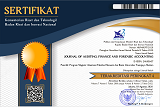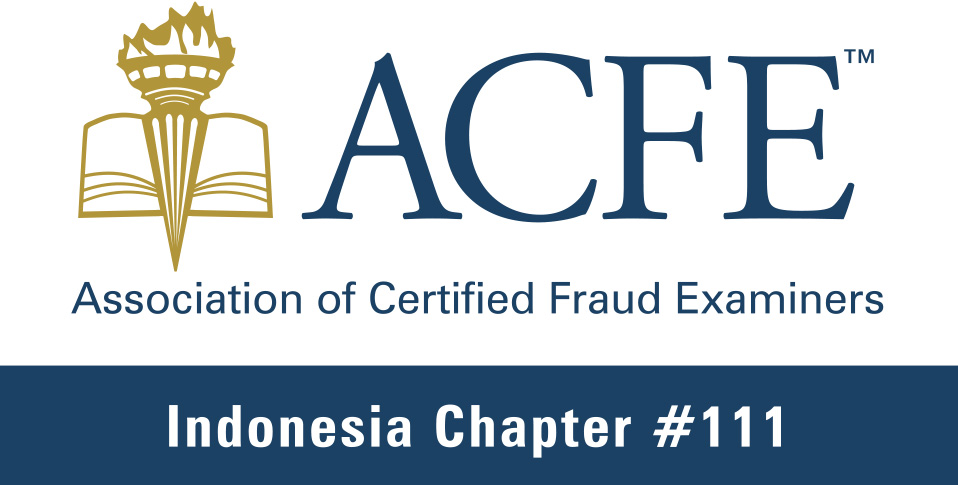Determinants of Internal Auditor’s Ability in Detecting Fraud with Supervision as Moderating Variable
Abstract
strengthen the ability of auditors to detect fraud. Interaction of supervision with time pressure and workload cannot weaken the ability of auditors to detect fraud. The government must recruit more Inspectorate Apparatuses in Central Java to mitigate time pressure and workload, so the auditor can detect fraud better.
Keywords
Full Text:
PDFReferences
Agustini, N. M. L.. (2017). The Effect of Task Complexity and Organizational Commitment on Auditor Performance with Supervision Measures as Moderating Variables. E-Jurnal Akuntansi Universitas Udayana Vol. 21: 1430-1459, ISSN: 2302-8556. Faculty of Economics and Business, Udayana University.
Alias, N. F., Nawawi, A. and Salin, A. S. A. P. (2019). Internal auditor’s compliance to code of ethics: Empirical findings from Malaysian Government-linked companies. Journal of Financial Crime, Vol. 26 No. 1: 179-194.
Alleyne, P. and Howard, M. (2005). An exploratory study of auditors’ responsibility for fraud detection in Barbados. Managerial Auditing Journal. Vol. 20 No. 3: 284-303.
Anggriawan, E. F. (2014). Effect of Work Experience, Professional Skepticism and Time Pressure on Auditor Ability to Detect Fraud. Jurnal Nominal Volume III Nomor 2. Yogyakarta State University Accounting Study Program.
Badera, I. D. N. (2019). The Effect of Organizational Commitment and Work Motivation on Auditor Performance with Supervision Measures as Moderating Variables. E-Jurnal Akuntansi Universitas Udayana Vol. 26: 1215-1240, ISSN: 2302-8556. Faculty of Economics and Business, Udayana University.
Bierstaker, J. L., Hunton, J. E. and Thibodeau, J. C. (2012). Does Fraud Training Help Auditors Identify Fraud Risk Factors?, Bobek Schmitt, D. (Ed.) Advances in Accounting Behavioral Research (Advances in Accounting Behavioural Research, Vol. 15), Emerald Group Publishing Limited, Bingley: 85-100.
Fransisco, F. (2019). Effect of Competence, Independence, and Time Pressure on Professional Ability as Intervening Variables. E-Journal ISSN (P) : 2615 – 2584. Program Magister Akuntansi Fakultas Ekonomi dan Bisnis Universitas Trisaksi.
Hartan, H. T. (2016). Effect of Professional Skepticism, Independence, and Competence on Auditor Ability to Detect Fraud. Jurnal Profita Edisi 3. Accounting Study Program, Faculty of Economics, Yogyakarta State University.
Hassink, H., Meuwissen, R. and Bollen, L. (2010). Fraud detection, redress and reporting by auditors. Managerial Auditing Journal. Vol. 25 No. 9: 861-881.
Hazami-Ammar, S. (2019). Internal auditors’ perceptions of the function’s ability to investigate fraud. Journal of Applied Accounting Research. Vol. 20 No. 2: 134-153.
Heider, F. (1958). The Psychology of Interpersonal Relations. Social Forces, Vol. 37 No 3 (Mar., 1959), pp. 272-273. Oxford University.
Hillison, W., Pacini, C. and Sinason, D. (1999). The internal auditor as fraud‐buster. Managerial Auditing Journal. Vol. 14 No. 7: 351-363.
JawaPos.Com. Korupsi di Jateng Nomor 2 Versi ICW, Ganjar: Buruk Banget. https://www.jawapos.com/jpg-today/12/02/2019/korupsi-di-jateng-nomor-2-versi-icw-ganjar-buruk-banget/. Accessed on date March 17, 2022.
Krambia‐Kapardis, M. (2002). A fraud detection model: A must for auditors. Journal of Financial Regulation and Compliance. Vol. 10 No. 3: 266-278.
Ken, G. (2017). Effect of Professional Skepticism, Workload and Time Pressure on Accounting Fraud Detection. Jurnal Akuntansi. Department of Accounting, Faculty of Business, Widya Mandala Catholic University, Surabaya.
Media Indonesia. Sudah 32 Kepala Daerah di Jawa Tengah Terjerat Korupsi. https://mediaindonesia.com/read/detail/121041-sudah-32-kepala-daerah-di-jawa-tengah-terjerat-korupsi. Accessed on date March 17, 2022.
Owusu‐Ansah, S., Moyes, G. D., Babangida Oyelere, P. and Hay, D. (2002) An empirical analysis of the likelihood of detecting fraud in New Zealand. Managerial Auditing Journal. Vol. 17 No. 4: 192-204.
Perry, L. M. and Bryan, B. J. (1997). Heightened Responsibilities of the Internal Auditor in the Detection of Fraud. Managerial Finance. Vol. 23 No. 12: 38-43.
Ratliff, R. L., Jenson, R. L. and Flagg, J. C. (1993). An Empirical Comparison of Internal and External Audit Supervision. Managerial Auditing Journal. Vol. 8 No. 2.
Rustiarini, N. W., Yuesti, A. and Gama, A. W. S. (2021). Public accounting profession and fraud detection responsibility. Journal of Financial Crime. Vol. 28 No. 2: 613-627.
Sari, Y. E. (2018). Effect of Workload, Experience, and Professional Skepticism on Auditor's Ability to Detect Fraud. Jurnal WRA, Vol, No 1. Department of Accounting, Faculty of Economics, Padjadjaran University.
Siagian, O. (2016). Effect of Time Budget Pressure, Task Complexity and Competence on Audit Quality with Audit Supervision as Moderation Variables for Empirical Studies at BPKP Representatives of South Sumatra Province. Jurnal Penelitian dan Pengembangan Akuntansi Vol. 10 No. 1 2016. Faculty of Economics, Sriwijaya University.
Suganda, T. R. (2018). The Effect of Professional, Independent Skepticism, and Auditor Experience on the Auditor's Ability to Detect Fraud. Jurnal Liquidity Vol. 7, No 1. Faculty of Economics and Business, Pancasila University.
Sugiyono. (2008). Metode Penelitian Kuantitatif, Kualitatif dan R&D. Bandung: Alfabeta.
Tempo.co. KPK: Opini WTP Tak Menajamin Bebas dari Korupsi. https://nasional.tempo.co/read/1096988/kpk-opini-wtp-tak-menjamin-bebas-korupsi. Accessed on date March 17, 2022.
Tobe, I. F. (2017). Effect of Auditor Experience and Auditor Independence on Fraud Detection. Jurnal Akuntnasi. Accounting Study Program, Faculty of Economics and Business, Indonesian Computer University.
Winston, P. (2018). The Role of Internal Audit on Compliance with Regional Apparatus in Financial Management at the Regional Inspectorate Office of North Sulawesi Province. Jurnal Riset Akuntansi Going Concern 13(4), 2018, 328-336. Department of Accountancy Sam Ratulangi University.
Yuara, S. (2018). The Effect of Auditor Professional Skepticism, Audit Evidence Competence and Time Pressure on Fraud Detectors at the Bener Meriah Regency Inspectorate. Journal Volume 4 Nomor 1 ISSN 2502-6976. Master of Accounting, Faculty of Economics and Business, Syiah Kuala University, Banda Aceh.
Yusrianti, H.. (2015). Effect of Audit Experience, Workload, Task Specific Knowledge on Fraud Detection of Financial Statements. Jurnal Manajemen dan Bisnis Sriwijaya Vol.13 No.1. Faculty of Economics, Department of Accounting, Sriwijaya University.
Zanzig, J. S. and Flesher, D. L. (2011). “Internal Auditors Speak Out on Controlling Employee Fraud", Jeffrey, C. (Ed.) Research on Professional Responsibility and Ethics in Accounting (Research on Professional Responsibility and Ethics in Accounting, Vol. 15), Emerald Group Publishing Limited, Bingley: 225-250.
DOI: https://doi.org/10.21107/jaffa.v10i2.15316
Refbacks
- There are currently no refbacks.
Our Journal indexed by:
Our support tools using:



This work is licensed under a Creative Commons Attribution 4.0 International License.












